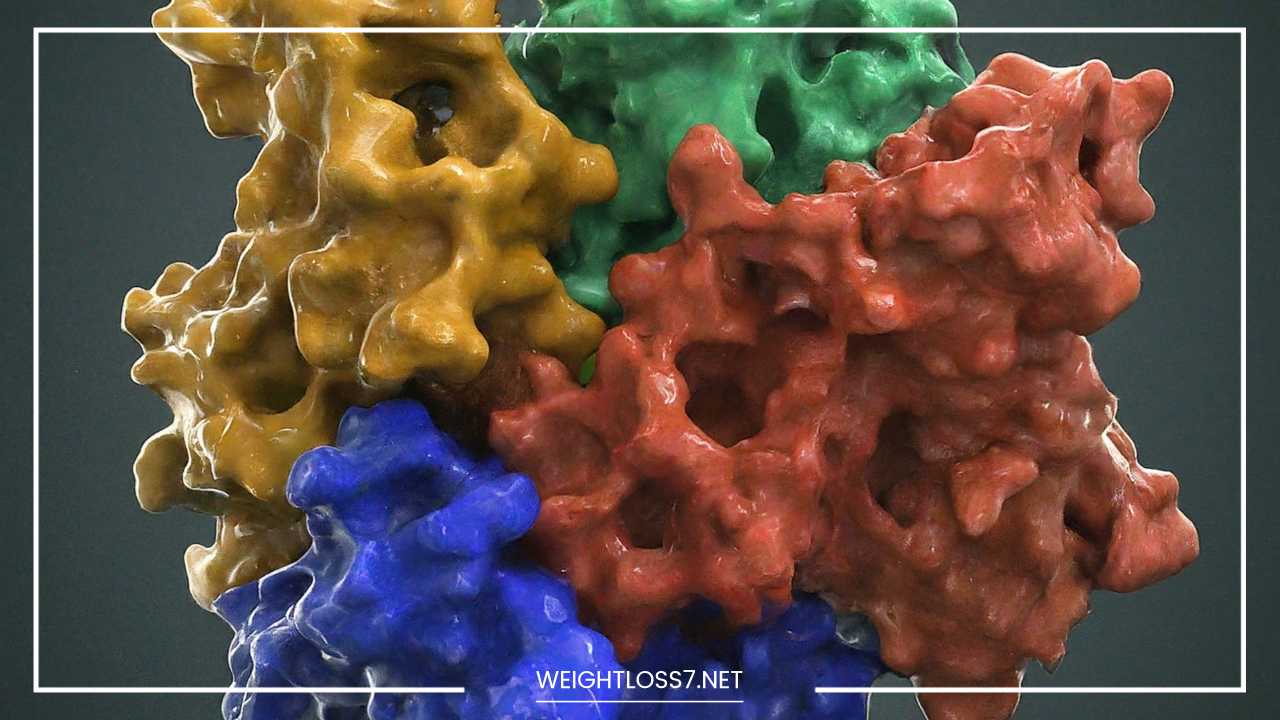Ghrelin: The Hunger Hormone and Its Impact on Weight Management

Ghrelin
Ghrelin: The “Hunger Hormone” and Its Symphony of Influence in Our Bodies
Ghrelin, often hailed as the “hunger hormone,” orchestrates a complex symphony within our bodies. Produced primarily by the stomach, this peptide hormone acts as a maestro, conducting the communication between our digestive system and the brain. Its primary role?
To ensure we don’t miss a beat when it comes to fueling ourselves. But ghrelin’s influence extends far beyond the simple pangs of hunger. It’s a multifaceted player in the intricate dance of our health, impacting everything from metabolism to mood.
The Hunger Symphony: Ghrelin’s Role in Appetite Regulation
Imagine a rumbling from deep within – that’s ghrelin raising its baton. Levels of this hormone rise naturally between meals, sending a crescendo of signals to the brain’s hypothalamus, the conductor of our appetite.
These signals translate to the familiar feeling of hunger, urging us to seek nourishment. As we eat and satiety sets in, ghrelin takes a backseat, allowing other hormones like leptin to take center stage, promoting feelings of fullness.
This cyclical interplay between ghrelin and other satiety hormones ensures a healthy balance of calorie intake and energy expenditure, keeping our bodies in perfect harmony.
Beyond the Hunger Cue: Ghrelin’s Diverse Roles in the Body’s Orchestra
While stimulating appetite is ghrelin’s primary act, it’s not the only instrument it plays in the body’s orchestra. Here are some of the other vital roles it fulfills:
- Growth Hormone Maestro: Ghrelin stimulates the pituitary gland, the orchestra’s backstage crew, to release growth hormone. This growth hormone plays a crucial role in building muscle, repairing tissues, and maintaining the strength of our bones, ensuring we have the stamina to keep performing throughout life.
- Energy Regulation: Think of ghrelin as the conductor ensuring the orchestra has enough fuel to perform. It promotes fat storage and helps regulate blood sugar levels by stimulating the release of glucagon from the pancreas. This ensures the body has readily available energy sources to keep the music going.
- The Reward System’s Encore: Ghrelin interacts with the brain’s reward system, adding a touch of sweetness to the experience of eating. It makes food more appealing, motivating us to seek it out and ensuring the “feeding time” movement in the symphony doesn’t get skipped.
- Gut Motility’s Rhythm: Before the main course of digestion can begin, ghrelin prepares the digestive system like a skilled stagehand. It increases gastric acid secretion and promotes stomach muscle contractions, ensuring everything is in tune for efficient food processing.
- The Symphony’s Unsung Hero: Research suggests ghrelin might be involved in regulating sleep patterns, cardiovascular function, and even emotional processing. It’s like a hidden instrument in the orchestra, subtly influencing the overall performance of our health.
Ghrelin and the Balancing Act of Weight Management
Understanding ghrelin’s influence on appetite can be a valuable tool for maintaining a healthy weight. Here’s how it plays out:
- The Detuning of Chronic Dieting: When we restrict calories significantly, it’s like trying to play a piece with a missing instrument. Ghrelin levels rise in response to this dietary restriction, leading to increased hunger and cravings. This can make it difficult to maintain weight loss, as the body pushes back against the imposed limitations.
- Obesity and a Muted Ghrelin: Studies suggest people with obesity may have lower ghrelin levels. This could potentially contribute to overeating or difficulty feeling full, as the body’s natural hunger cues are dampened.
- A Harmonious Diet: Focusing on regular meals and balanced portions can help regulate ghrelin levels and promote healthy hunger cues. It’s like ensuring all the instruments in the orchestra are playing in tune, leading to a more balanced and sustainable approach to food intake.
Can We Influence the Ghrelin Symphony?
While we can’t directly control ghrelin production, certain lifestyle factors can act as conductors, influencing its levels and impact on our health:
- Sleep, the Silent Conductor: Getting enough sleep (around 7-8 hours for adults) can help regulate ghrelin and other hormones that impact appetite. Think of sleep as the rehearsal time for the body’s orchestra, ensuring all the instruments are in tune for a smooth performance when it comes to managing hunger.
- Stress Management, the Calming Influence: Chronic stress can disrupt the entire orchestra, including ghrelin. Techniques like meditation or yoga can help manage stress and potentially keep ghrelin levels in check, preventing it from going into overdrive.
- Protein, the Satiety Soloist: Including protein in every meal can be like adding a strong soloist to the symphony. Protein promotes satiety and potentially reduces ghrelin’s hunger-inducing effects, ensuring a more balanced performance.
- Mindful Eating, the Attentive Conductor: Paying close attention to hunger and fullness cues and avoiding distractions while eating allows you to become the conductor of your own internal orchestra. By focusing on the body’s natural signals, you can reduce reliance solely on ghrelin and make informed choices about when and how much to eat.
Ghrelin: The Future Melody of Weight Management
Research on ghrelin is like an ongoing musical composition, with scientists constantly adding new notes and movements to understand its potential role in developing weight-loss strategies. Here are some possibilities for future interventions:
- Ghrelin Antagonists: Silencing the Hunger Crescendo: Medications that block ghrelin’s effects might be like introducing a mute switch for this particular instrument. This could potentially help suppress appetite and reduce calorie intake, creating a quieter and more controlled environment for weight management.
- Ghrelin Mimetics: Introducing a Missing Instrument: Conversely, for individuals with certain health conditions where ghrelin levels are low, drugs that mimic ghrelin’s action could be introduced as a new instrument. This would help stimulate a healthy appetite and promote weight gain in those who need it.
The Harmony of Collaboration: Ghrelin and a Holistic Approach
It’s crucial to remember that ghrelin is just one instrument in the complex orchestra regulating appetite and weight. Research into ghrelin and its applications is still in its early stages, and future discoveries may reveal even more about its influence.
Consulting a healthcare professional is always recommended before considering any interventions aimed at altering hormone levels.
Ghrelin – The Maestro Within
Ghrelin is a fascinating hormone that plays the role of a maestro within our bodies. It conducts a symphony of functions, influencing everything from hunger to energy regulation and even our emotional well-being.
Understanding its diverse roles empowers us to make informed decisions about diet, lifestyle, and ultimately, our overall health.
As research delves deeper into the intricacies of ghrelin’s influence, we can expect even greater insights into how to maintain a healthy weight and achieve optimal well-being.
By working in harmony with this internal maestro, we can create a beautiful symphony of health that plays out throughout our lives.
Ghrelin’s Influence Beyond Weight Management: A Broader Performance
Ghrelin’s impact extends beyond just the weight management stage in our body’s grand performance. This multifaceted hormone plays a role in various physiological processes, potentially influencing our health in surprising ways.
- Digestive Health: Ghrelin’s influence on gastric acid secretion and gut motility contributes to efficient food breakdown and nutrient absorption. It’s like the opening act of digestion, ensuring a smooth start to the process.
- Metabolic Regulation: Ghrelin interacts with other hormones involved in metabolism, potentially influencing how our bodies utilize energy from food. It might play a role in thermogenesis, the generation of heat by the body, which can impact calorie expenditure.
- Bone Health: Research suggests ghrelin may stimulate bone formation and protect against bone loss. This could be particularly important for maintaining bone health as we age.
- Sleep and the Circadian Rhythm: Ghrelin levels naturally fluctuate throughout the day, following a circadian rhythm. This interplay between ghrelin and sleep-wake cycles highlights a potential connection between our hunger cues and sleep patterns.
- Mood and Emotional Processing: Studies suggest ghrelin might be involved in regulating mood and emotional well-being. The “feel-good” association with eating, influenced by ghrelin’s interaction with the reward system, could have broader implications for our emotional state.
Ghrelin and Potential Health Conditions
While ghrelin is essential for maintaining a healthy body, imbalances in its levels can be associated with certain health conditions:
- Ghrelin Deficiency: Conditions like Prader-Willi syndrome, a rare genetic disorder, can lead to ghrelin deficiency. This can cause symptoms like chronic hunger, excessive eating, and difficulty maintaining a healthy weight.
- Ghrelin Overexpression: Certain cancers and other medical conditions might be associated with elevated ghrelin levels. This can contribute to increased appetite and weight gain, making it a potential target for treatment strategies.
The Evolving Story of Ghrelin
Research on ghrelin is constantly evolving, with scientists uncovering new aspects of its influence on our health. Here are some exciting areas of exploration:
- Ghrelin and the Gut Microbiome: The complex community of microbes living in our gut appears to interact with ghrelin production. Understanding this connection could provide insights into personalized dietary and lifestyle interventions for weight management and overall health.
- Ghrelin and Cognitive Function: Emerging research suggests a potential link between ghrelin and cognitive function, including memory and learning. This opens doors for exploring ghrelin’s role in age-related cognitive decline and potential therapeutic strategies.
- Ghrelin and Individual Differences: Ghrelin sensitivity may vary from person to person. Genetics and lifestyle factors might influence how individuals respond to ghrelin’s hunger cues. Understanding these variations could lead to more personalized approaches to weight management and overall well-being.
Final Word: Ghrelin – A Symphony of Complexity
Ghrelin is a fascinating and complex hormone, acting as a maestro within the orchestra of our bodies. Its influence extends far beyond just hunger, impacting various aspects of our health and well-being.
As research continues to unveil the intricacies of ghrelin’s role, we can expect even greater insights into maintaining optimal health and preventing disease.
By appreciating the intricate symphony conducted by ghrelin, we can work in harmony with this internal maestro to create a healthier and more fulfilling life.

















